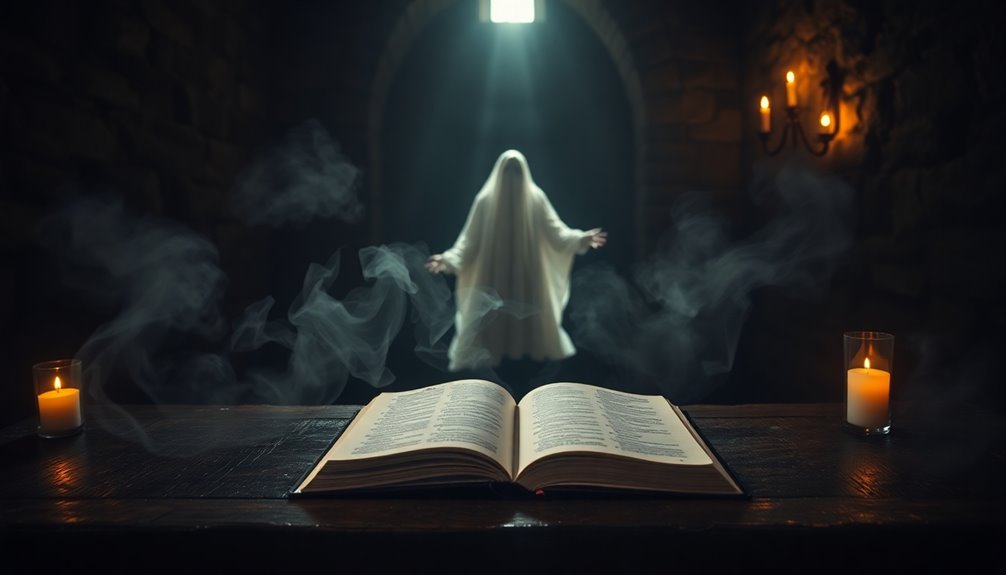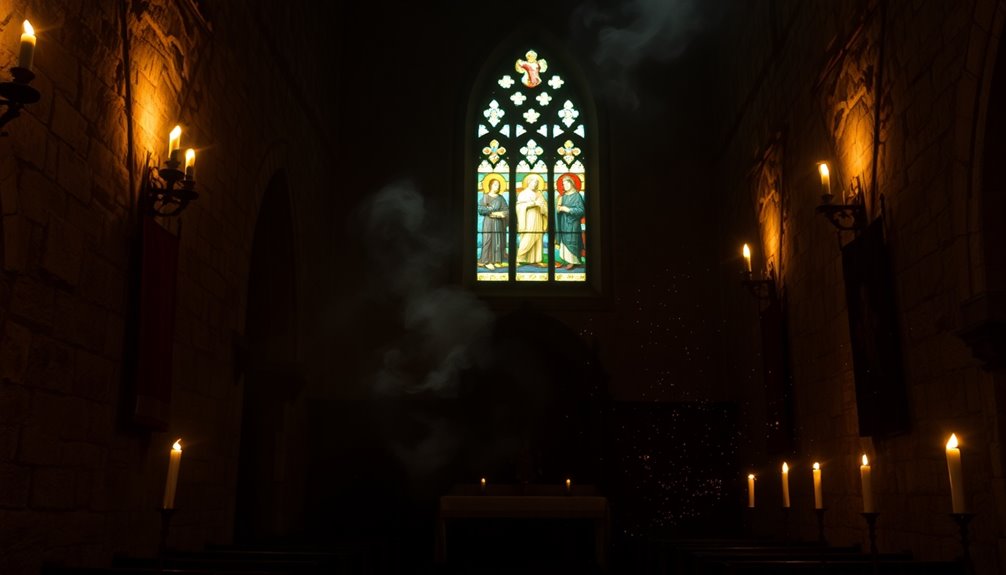The Bible has a clear stance on ghosts. It teaches that all people face judgment after death, as seen in Hebrews 9:27, and emphasizes that the dead know nothing (Ecclesiastes 9:5-6). Ghostly appearances may actually be demonic entities, warning against seeking out mediums in 1 Samuel 28. Cultural beliefs often twist these concepts, portraying ghosts as souls with unfinished business, but the Bible encourages reliance on God instead of fear or supernatural engagements (Isaiah 8:19). If you're curious about how these beliefs influence modern perceptions, there's a lot more to uncover.
Key Takeaways
- The Bible teaches that after death, individuals face judgment, negating the concept of haunting (Hebrews 9:27).
- Ecclesiastes 9:5-6 states the dead know nothing and lack consciousness.
- Ghostly appearances may be linked to demonic entities, as warned against in Ephesians 6:12.
- Engaging with the supernatural, such as consulting mediums, is prohibited in scriptures like Leviticus 19:31.
- Believers are encouraged to rely on God for protection and to resist fear of ghosts (Romans 8:31, Psalm 91:9-11).
Introduction

Throughout history, people have been fascinated by the idea of ghosts and what happens after death. In the Bible, the term "ghost" appears 108 times, often in the context of death, as when someone "gives up the ghost."
But it's crucial to understand how the Bible distinguishes between spirits and the concept of ghosts. The scriptures assert that human spirits don't linger after death; instead, Hebrews 9:27 emphasizes that everyone faces judgment rather than returning to haunt the living.
Instances like King Saul's consultation with the medium of Endor highlight the biblical prohibition against seeking contact with the dead. The Bible warns against engaging with familiar spirits and mediums, indicating a clear stance against the acceptance of ghosts as disembodied souls.
Instead, the texts suggest that ghostly appearances are more likely manifestations of demonic entities rather than the spirits of the departed. Angels, on the other hand, are viewed positively in the Bible, serving as messengers from God.
This distinction between angels and ghosts shapes a biblical understanding of the spirit world, urging caution and discernment in spiritual matters.
Biblical Insights on Spirits

When you explore biblical insights on spirits, you'll find clear distinctions between human spirits and other spiritual beings.
Key references highlight that ghosts, as the disembodied spirits of the deceased, don't exist according to scriptures like Hebrews 9:27.
Instead, the Bible emphasizes the presence of angels and demons, underscoring a spiritual battle at play in our lives.
Primary Bible References
The Bible provides clear insights into the nature of spirits, often using the term "ghost" in specific contexts that differ from modern interpretations. For instance, in the King James Version, "ghost" typically refers to the Holy Ghost or the act of dying, not to disembodied spirits of deceased humans. The Bible teaches that dead loved ones know nothing and have no reward (Ecclesiastes 9:5-6), suggesting a state of complete awarenesslessness in the afterlife.
Furthermore, the account of King Saul consulting a medium to summon Samuel (1 Samuel 28) illustrates the prohibition against seeking communication with the deceased. This implies that such encounters aren't typical or condoned. Job 7:9-10 and Psalm 146:4 reinforce the idea that once a person dies, they don't return to earthly life, highlighting the finality of death from a biblical perspective.
The Bible also distinguishes between human spirits and spiritual beings, indicating that reports of ghosts are more likely to be demonic impersonations than actual spirits of the dead (Ephesians 6:12).
In essence, the biblical view challenges the modern understanding of ghosts and emphasizes caution in dealing with spiritual encounters.
Secondary Bible References
Biblical insights on spirits reveal a nuanced understanding that goes beyond mere specters haunting the living. The term "ghost" appears 108 times in the KJV Bible, often relating to death or the Holy Spirit rather than disembodied spirits of the deceased. For instance, in 1 Samuel 28, King Saul's encounter with the medium of Endor shows a rare communication with a spirit, specifically that of Samuel, which is ultimately condemned in scripture.
Ecclesiastes 9:5-6 emphasizes that the dead know nothing and possess no reward, reinforcing the idea that death is final and devoid of haunting. Additionally, Leviticus 19:31 and Deuteronomy 18:10-11 clearly prohibit seeking familiar spirits and mediums, indicating that such practices are discouraged.
The Bible also states in Hebrews 9:27 that individuals die once and then face judgment, further asserting that there's no return to interact with the living in spirit form after death.
In this context, references to fallen angels can highlight deceptive spiritual encounters, reminding you to tread carefully when exploring matters of the spirit world.
Ancient Beliefs About Spirits

Ancient civilizations were rich with beliefs about spirits, often distinguishing between those that were benevolent, like guardian ancestors, and malevolent ones that could bring harm.
You'd find that many cultures believed spirits could influence the living, leading them to conduct rituals to appease or communicate with these entities. This echoes biblical warnings against such practices, as engaging with spirits was seen as dangerous.
The concept of familiar spirits, referenced in scriptures like Leviticus 19:31, highlights a longstanding concern about interacting with the dead or other supernatural forces. People believed these spirits could help or hinder them, often related to feelings of unfinished business left by Dead People.
Ancient Near Eastern texts reveal similar fears and reverence for spirits, attributing natural events or personal misfortunes to the actions of these unseen entities.
In contrast, the biblical narrative frequently counters these ancient beliefs, emphasizing God's sovereignty over all spirits and the finality of death. This is particularly evident in Hebrews 9:27, which reminds you that death is a definitive endpoint, reinforcing the idea that meddling with spirits can lead to spiritual danger.
Cultural Views on Spirits

Cultural views on spirits vary widely, shaped by historical, religious, and social contexts. You'll find that cultural narratives often depict ghosts as souls of deceased individuals who've unfinished business. This belief highlights a common perception of the dead lingering among the living.
In many societies, ghosts aren't just seen as restless spirits; they can also be protectors or guides. Ancestral spirits are honored through rituals and offerings, creating a deep respect for those who came before.
The fascination with ghosts is further amplified by contemporary media, where supernatural encounters are sensationalized in movies and television shows. This portrayal can distort perceptions, making the supernatural seem more thrilling than it may be in reality.
Events like Halloween capitalize on these themes, presenting ghosts as playful or mischievous rather than malevolent, which reflects society's complex relationship with the unknown.
Sociological studies reveal that one in five Americans report experiencing paranormal activity, underscoring a significant cultural interest in spirits. This curiosity drives many to explore the mysteries of the afterlife, continuing to shape how we understand and interact with the concept of ghosts in our lives.
Ghosts in Popular Culture

When you think about ghosts in popular culture, it's easy to get caught up in the thrilling tales of spirits seeking closure or haunting the living.
However, many misconceptions surround these ghostly figures, often leading to skepticism about reported sightings.
Debunk Common Ghost Misconceptions
While many people enjoy the thrill of ghost stories in movies and television, these depictions often stray far from biblical truths. Popular culture typically portrays ghosts as spirits of the deceased, returning to haunt the living. However, the Bible clearly states that after death, individuals face judgment (Hebrews 9:27), eliminating the possibility of haunting.
Furthermore, themes of unfinished business in ghost narratives contradict biblical teachings, which assert that the dead don't return to interact with the living (Job 7:9-10).
Many ghost stories also touch on familiar spirits, yet Scripture warns against seeking such entities, labeling them as deceptive and harmful (Leviticus 19:31; Deuteronomy 18:11). Instead of romanticizing ghostly encounters, the Bible suggests that reports of these sightings may be linked to demonic activity (2 Corinthians 11:14-15).
If you find yourself fascinated by the paranormal, it's crucial to remember that Scripture encourages you to turn to God. Engaging with the supernatural can lead you away from biblical truth, as reliance on the Holy Spirit should be your guiding light (Isaiah 8:19).
Skepticism About Ghost Sightings
Skepticism about ghost sightings often stems from the dissonance between personal experiences and biblical teachings. While around one in five Americans claim to have seen a ghost, these claims can clash with traditional views on the existence of ghosts. Popular culture fuels this fascination, often portraying spirits as entities with unfinished business, which can lead us to question the validity of these encounters.
Television shows and movies about ghost hunting have normalized ghost narratives, making it easy for us to accept supernatural phenomena as a part of our reality. However, this cultural portrayal may skew our perceptions, making it difficult to discern between genuine experiences and sensationalized stories. Ghosts are frequently depicted as symbols of fear and curiosity, shaping our understanding of death and the afterlife.
Moreover, celebrations like Halloween further amplify our collective anxieties and fascinations around ghosts. These elements contribute to a cyclical process, where cultural narratives and personal beliefs continuously influence each other.
As you navigate these stories, consider how they align with your understanding of faith and spirituality, and whether they truly reflect the biblical perspective on the existence of ghosts.
Faith in Confronting Fears

Facing personal fears can feel overwhelming, but you don't have to do it alone.
Group discussions can provide support and encouragement as you share your experiences and insights about fear.
Let's explore how faith can help you confront those fears together, drawing strength from God's promises.
Facing Personal Fears Together
In times of uncertainty, confronting personal fears can feel overwhelming, especially when those fears involve the unknown, such as ghosts or spiritual entities. Instead of seeking answers from the supernatural, remember that the Bible encourages you to rely on God's promises. King Saul faced his fears by consulting a medium, but that path only led to more despair. You can choose a different approach.
By embracing faith, you can confront your fears head-on. Romans 8:31 reassures you that God is for you, making it unnecessary to fear adversaries, including ghosts. 1 John 4:4 reminds you that the Holy Spirit within you is greater than any fear or evil spirit in the world. When you submit to God and resist the devil, as James 4:7-8 advises, you empower yourself to overcome those haunting fears.
Psalm 91:9-11 offers comfort, promising divine protection and that angels watch over you. Engaging in prayer and seeking support from fellow believers can strengthen your faith, creating a community that faces fears together.
With God's guidance and the support of others, you can find peace in confronting even the most daunting fears.
Group Discussions on Fear
Gathering together to discuss fears can be incredibly enlightening and empowering. When you share your experiences, like having seen a ghost or experiencing unexplainable phenomena, you're not just revealing your fears; you're also inviting faith into the conversation.
The Bible warns us about the spirit of fear, reminding us that God has given us a spirit of power, love, and a sound mind (2 Timothy 1:7).
As you delve into these discussions, remember that you're not alone. The Holy Ghost serves as your comforter, and God commands His angels, or ministering spirits, to guard you against harm (Psalm 91:9-11). This knowledge can help dispel your fears, as you realize that if God is for you, no one can stand against you (Romans 8:31).
Confronting fears collectively allows you to draw strength from one another. By submitting to God and resisting the devil (James 4:7), you can confront those fears head-on.
Sharing your thoughts and feelings in a supportive group can foster a deeper understanding of how faith can transform fear into courage, reinforcing the truth that perfect love indeed casts out fear (1 John 4:18). Additionally, just as curcumin's anti-inflammatory properties can provide relief from physical discomfort, faith can alleviate the emotional burdens of fear.
Biblical Perspective on Fear

Fear can often feel overwhelming, especially when it comes to the supernatural. The Bible offers a clear perspective that helps you navigate these feelings. For instance, 1 John 4:4 reassures you that the One in you is greater than anything destined to die, including evil spirits. This truth empowers you to confront fear head-on.
James 4:7-8 encourages you to submit to God and resist evil, reminding you that drawing near to Him strengthens your resolve against fear. Instead of succumbing to dread, you can find comfort in Psalm 91:9-11, which promises divine protection. God commands His angels to guard those who trust Him, ensuring you're never alone in your battles.
It's important to recognize that fear often masquerades as an angel of light, as demonic forces can manipulate perceptions, leading you to see things as ghosts.
However, Romans 8:31 affirms that if God is for you, no one can stand against you. By embracing these biblical truths, you can stand firm as a servant of righteousness, equipped to face whatever supernatural encounters may come your way.
Additional Resources

Understanding what the Bible says about ghosts can further strengthen your faith and guide your beliefs. To deepen your understanding, consider exploring biblical commentaries that clarify key passages, such as Hebrews 9:27, which emphasizes that individuals face judgment after death. This reinforces the idea that ghosts, as disembodied spirits, aren't supported by scripture.
You might also look into resources discussing the story of the prophet Samuel in 1 Samuel 28, where a medium conjures his spirit. This narrative highlights the dangers of engaging with familiar spirits, as the Bible explicitly prohibits such practices to protect you from spiritual defilement (Leviticus 19:31, Deuteronomy 18:10-11).
Furthermore, consider studying how 2 Corinthians 11:14-15 warns that Satan himself masquerades as an angel of light, reminding you to discern the truth and avoid potential spiritual deception.
Ultimately, these resources can teach us to rely on God and the Holy Spirit rather than pursuing paranormal activities. Embracing biblical teachings can help you navigate modern cultural fascinations with ghosts, reinforcing your faith and understanding of the spiritual realm.
Frequently Asked Questions
What Does the Bible Say About a Ghost?
When you think about a ghost, you might picture a spirit lingering after death.
However, the Bible presents a different view. It suggests that the dead don't know anything or haunt the living. Instead, instances of so-called ghosts often relate to demonic spirits.
When you consider Jesus' resurrection, He clearly stated He's not a ghost, reinforcing that biblical teachings don't support the idea of disembodied spirits roaming the earth.
Is Believing in Ghosts a Sin?
Believing in ghosts isn't explicitly labeled as a sin, but it can lead you away from trusting God's guidance.
The Bible warns against engaging with the supernatural and consulting mediums, emphasizing that such practices can open the door to spiritual deception.
Instead of focusing on ghostly encounters, it's essential to rely on God's truth and teachings, fostering spiritual growth and aligning your beliefs with biblical principles for a faithful life.
What Does the Bible Say About Dead Spirits?
When you explore what the Bible says about dead spirits, you'll find that it emphasizes finality in death.
Hebrews 9:27 reminds you that everyone faces judgment, not haunting the living.
Ecclesiastes 9:5-6 highlights that the dead know nothing, reinforcing this idea.
Additionally, Leviticus 19:31 warns against contacting familiar spirits, indicating a clear distinction between human spirits and other entities.
What Does a Ghost Symbolize Spiritually?
A ghost often symbolizes confusion, fear, and the unknown in spiritual contexts.
When you encounter discussions about ghosts, think of them as representations of unresolved issues or emotional turmoil. They can embody feelings of loss or fear of the afterlife.
Spiritually, they might indicate a need for healing or closure. Engaging with these symbols can prompt you to explore deeper truths about your own emotional and spiritual state.










